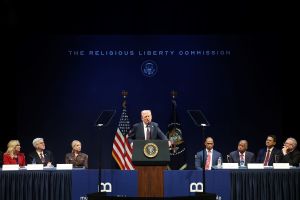Religious freedom protections added to Senate gay marriage bill don't go far enough, advocates warn

A bill to enshrine the right to same-sex marriage into federal law cleared a major procedural hurdle in the U.S. Senate Wednesday, with critics saying that a religious freedom amendment added to the legislation doesn't adequately protect those with deeply held beliefs that marriage is between one man and one woman.
In a 62-37 vote, the U.S. Senate invoked cloture on the Respect for Marriage Act. The support of 12 Senate Republicans enabled the bill to clear the 60-vote threshold for cloture required for most legislation to pass the Senate. Debate on the bill will continue before a final vote on passage.
The measure would codify the 2015 U.S. Supreme Court decision Obergefell v. Hodges, which established a right to same-sex marriage, into federal law and formally repeal the unenforced Defense of Marriage Act, which defines marriage as a union between one man and one woman at the federal level.
The Respect for Marriage Act previously passed the Democrat-controlled U.S. House of Representatives in July with the support of all Democrats and 47 House Republicans.
The legislation would require all states to give "full faith and credit to any public act, record, or judicial proceeding of any other State pertaining to a marriage between 2 individuals, on the basis of the sex, race, ethnicity, or national origin of those individuals."
Passage of the bill has become a top priority for congressional Democrats following the U.S. Supreme Court's June decision in Dobbs v. Jackson Women's Health Organization, determining that the U.S. Constitution doesn't contain a right to abortion. In a concurring opinion in Dobbs, Justice Clarence Thomas described the substantive due process as "legal fiction," suggesting that the justices should "reconsider all of this Court's substantive due process precedents," including Obergefell.
While Democrats hail the Respect for Marriage Act as a necessary step following the Dobbs decision, the legislation has drawn concern from Christian leaders and religious liberty advocates.
On Tuesday, key supporters of the Respect for Marriage Act announced the addition of the amendment to the bill designed to address the concerns of religious liberty advocates.
The amendment includes a section declaring that "Nothing in this Act, or any announcement made by this Act, shall be construed to diminish or abrogate a religious liberty or conscience protection otherwise available to an individual or organization under the Constitution of the United States or Federal Law."
Additionally, the amended text insists that "nonprofit religious organizations," such as churches, synagogues and mosques, and explicitly faith-based organizations and those who work for them, will not have to perform or provide services for same-sex marriages.
The amended Respect for Marriage Act only includes religious liberty protections for individuals explicitly affiliated with faith-based organizations and those performing explicitly religious services. Such protections do not extend to deeply religious individuals who perform secular services.
Sen. Mike Lee, R-Utah, who introduced his own amendment that wasn't considered, believes the religious liberty protections added to the bill are "woefully insufficient."
"Religious Americans will be subject to potentially ruinous litigation, while the tax-exempt status of certain charitable organizations, educational institutions, and non-profits will be threatened," Lee said in a statement. "My amendment would have shored up these vulnerabilities. It's a shame it wasn't included."
Speaking on the Senate floor, Sen. James Lankford, R-Okla., said the bill "would certainly affect the religious liberty of countless people across the country." He recited the words of former President Barack Obama's comments following the Supreme Court's 2015 gay marriage ruling.
"I know that Americans of goodwill continue to hold a wide range of views on this issue. Opposition in some cases has been based on sincere and deeply held beliefs," Obama said. "All of us who welcome today’s news should be mindful of that fact; recognize different viewpoints; revere our deep commitment to religious freedom."
Lankford warned the bill puts "faith-based child welfare organizations who are operating in accordance with their sincerely held religious beliefs" in jeopardy.
"And while some of my colleagues may say that is far-fetched, may I remind you the Supreme Court has already handed out a decision in the Fulton case and remind them that this is continuing to happen," Lankford said, referencing the Supreme Court's 2021 ruling in favor of a Catholic adoption agency punished by the city of Philadelphia for operating in accordance with its religious beliefs on marriage.
The conservative Christian nonprofit legal organization Liberty Counsel said in a statement Wednesday that "this bill will not protect the religious beliefs of people like the Christian website designer with 303 Creative."
The reference is to Colorado web designer Lorie Smith, a Christian whose case against Colorado's discrimination law requiring her to create websites for same-sex weddings should she offer wedding website services will be heard by the U.S. Supreme Court. Liberty Counsel filed an amicus brief in support of Smith's case.
"[The Respect for Marriage Act] will overturn any victory from that case, and she will be forced to create websites celebrating same-sex marriage," Liberty Counsel warns.
Rev. Franklin Graham, CEO of Samaritan's Purse and the Billy Graham Evangelistic Association, took to Facebook Wednesday to warn that "this bill strikes a blow at religious freedom for ministries and individuals and is really the 'Destruction of Marriage Act.'"
"Its sponsors remarkably claim it protects religious freedom. It does not," he added. "This disastrous bill sends a message to America that if you don't agree with the left's definition of marriage, you are a bigot. Southern Baptist Theological Seminary President Albert Mohler wrote, 'Anyone who would redefine, the most fundamental building block of society, is no conservative, no friend of the natural family, and no defender of family values.'"
Tony Perkins, president of the Washington-based Christian conservative advocacy group Family Research Council, said in a statement that the Senate bill "tramples on a foundational right" to religious freedom.
"Whether by the Court or by the Congress, truth cannot be altered," Perkins said. "Regardless of the action of Congress, there are millions of Americans who will remain steadfast in their love for their fellow human being, by remaining committed to these truths: that marriage is ordained by God and men and women are created in His image."
Republicans who voted to invoke cloture are Roy Blunt, R-Mo.; Richard Burr, R-N.C.; Shelley Moore Capito, R-W.Va.; Susan Collins, R-Maine; Joni Ernst, R-Iowa; Cynthia Lummis, R-Wyo.; Lisa Murkowski, R-Alaska; Rob Portman, R-Ohio; Mitt Romney, R-Utah; Dan Sullivan, R-Alaska; Thom Tillis, R-N.C.; and Todd Young, R-Ind.
Before the bill can become law, it will have to go back to the House, which will vote on the amended version of the legislation. Public opinion polling reveals high support for same-sex marriage in the U.S., with a poll taken by Gallup earlier this year measuring support for allowing same-sex couples to marry at 71%.
Ryan Foley is a reporter for The Christian Post. He can be reached at: ryan.foley@christianpost.com



























